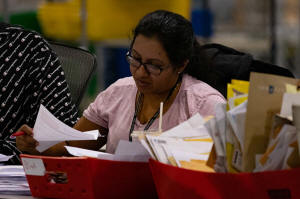Pennsylvania can discard undated mail-in ballots, US appeals court rules
 Send a link to a friend
Send a link to a friend
 [March 28, 2024]
By Nate Raymond [March 28, 2024]
By Nate Raymond
(Reuters) - A U.S. appeals court on Wednesday rejected a challenge to a
Pennsylvania rule that allowed the state to discard mail-in ballots that
arrive on time but in envelopes with missing or incorrect dates written
on them by voters.
Voting rights advocates said the Philadelphia-based 3rd U.S. Circuit
Court of Appeals' 2-1 ruling in favor of Republicans could allow for
thousands of ballots to be discarded that are cast by voters in
Pennsylvania, a key battleground state in the upcoming November
presidential election.
Several advocacy groups including the Pennsylvania State Conference of
the NAACP had sued in 2022 to challenge a state requirement that
counties reject mail-in ballots with a missing or wrong date written on
their envelopes.
Litigation over Pennsylvania's mail-in ballot rules was also a feature
of the 2020 presidential election in which Republican then-President
Donald Trump lost the state to Democratic challenger Joe Biden.
Democrats actively used mail-in voting in 2020, helping Biden win the
state over Trump by some 80,000 votes. Biden will face Trump again in
November's elections.
In 2022's midterms, more than 10,000 ballots were discarded in
Pennsylvania based on what the voting rights groups said were
inconsequential paperwork errors, in violation of a provision of the
federal Civil Rights Act of 1964.
The law, enacted to protect Black and other minority voters, has a
"materiality provision" that prohibits denying someone the right to vote
just because of an error on paperwork.

A lower-court judge last year agreed the state requirement violated the
materiality provision, prompting an appeal by the Republican National
Committee and other Republican groups defending the state requirement.
[to top of second column]
|

A worker recreates overseas and military ballots for processing
during the 2022 U.S. midterm election in Philadelphia, Pennsylvania,
U.S., November 10, 2022. REUTERS/Hannah Beier/ File Photo

In Wednesday's ruling, U.S. Circuit Judge Thomas Ambro, an appointee
of Democratic former President Bill Clinton, said the materiality
provision only applies when a state is determining who may vote and
not to the rules governing how they may do so.
"In other words, its role stops at the door of the voting place,"
Ambro wrote in an opinion joined by U.S. Circuit Judge Cindy Chung,
an appointee of Democratic President Joe Biden.
U.S. Circuit Judge Patty Shwartz, an appointee of Democratic former
President Barack Obama, dissented, saying the ruling would allow
Pennsylvania to "toss a ballot cast by a qualified voter based upon
mistakes on required paperwork immaterial to determining voter
qualifications."
Ari Savitzky, a lawyer for the voting rights groups at the American
Civil Liberties Union, in a statement said they "are considering all
of our options at this time," which could include an appeal to the
U.S. Supreme Court.
The decision was one of several court rulings nationally on
Wednesday that could shape upcoming electoral contests. A federal
court upheld Florida's congressional map, rejecting a lawsuit
claiming it discriminated against Black voters.
(Reporting by Nate Raymond in Boston; Editing by Edwina Gibbs)
[© 2024 Thomson Reuters. All rights reserved.]This material
may not be published, broadcast, rewritten or redistributed.
Thompson Reuters is solely responsible for this content. |